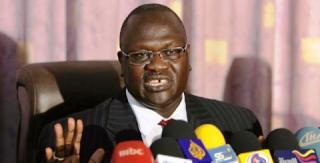S. Sudan’s former VP decries constitutional violations in the country
October 20, 2013 (JUBA) – South Sudan’s former vice president Riek Machar says the country has witnessed continuous violations of national and states’ constitutions, calling on the judiciary to intervene and uphold the supreme laws of the land.

The first deputy chairman of the south-governing Sudan Peoples Liberation Movement (SPLM) said the country’s president, under the national transitional constitution, had no authority to remove a member of parliament, more than two years after the transitional period began on 9 July 2011.
Machar who was sacked from his position in July this year after falling out Kiir over the direction of the country, criticised last week’s decision by the president to remove Unity state lawmaker Joseph Nguen Monytuil, now re-appointed caretaker governor.
The former vice-president, however, said it was constitutionally and procedurally correct for Monytuil to submit his resignation to parliament; or equally it would have been the parliament to relieve him, but not by the president, even if the president previously appointed him to the parliament.
Monytuil became the second caretaker governor to be appointed by president Kiir after the appointment of another caretaker military governor for Lakes state, Matur Chut Dhuol, this year.
Dhuol and Monytuil replaced 2010 elected governors, Chol Tong Mayay, and Taban Deng Gai, respectively, who were fired through presidential decrees.
However, while the transitional constitution calls for the caretaker governors to organise gubernatorial elections within two months from their date of appointment, none has done so, with Dhuol nearly eight months in office as a caretaker governor.
Neither the office of the president nor the national parliament, has questioned the non-implementation of the constitutional provision.
He also criticized the action by the governor of Upper Nile state, Simon Kun Puoch, who on Saturday issued a gubernatorial decree dismissing the speaker of the state parliament and appointed a new successor and deputy.
Puoch last week came to Juba to consult with the president on how to intervene in the affairs of the state parliament during which he announced on the state-run SSTV that the president had given him the power to direct the parliament in the state.
The state parliament was faced with a situation in which the former speaker, Chol Chouli, was reportedly absent from his duty for several months while on visit to Juba following a power wrangling between him and his deputy, Chuol Deep.
In accordance with the conduct of business in the state parliament, a member of parliament would simply raise a motion against the speaker’s conduct that may lead to a vote of no confidence; thus his dismissal per the resolution.
Governor Puoch on Saturday, however, dismissed Chouli through an executive decree and appointed a new speaker, Joseph Deng Faraj and his deputy, Akeer Akuei Kur.
Machar decried the direct interventions by the executive in the internal businesses of parliament, which he said were unconstitutional and amounted to clear violations of the respective constitutions.
“He [Puoch] has no authority in such a situation. Such decisions should be challenged in court and the judiciary should assist in it”, he said.
The former vice-president has been calling on the president, who was also criticised by members of parliament for allegedly imposing the current leadership of the national parliament, to protect the constitutions of the country.
Observers say there are worrying signs indicating that the country may be heading toward anarchy and disregard to the provisions of the constitutions, warning of increasing unilateral official decisions driven from outside the constitutions.
(ST)
